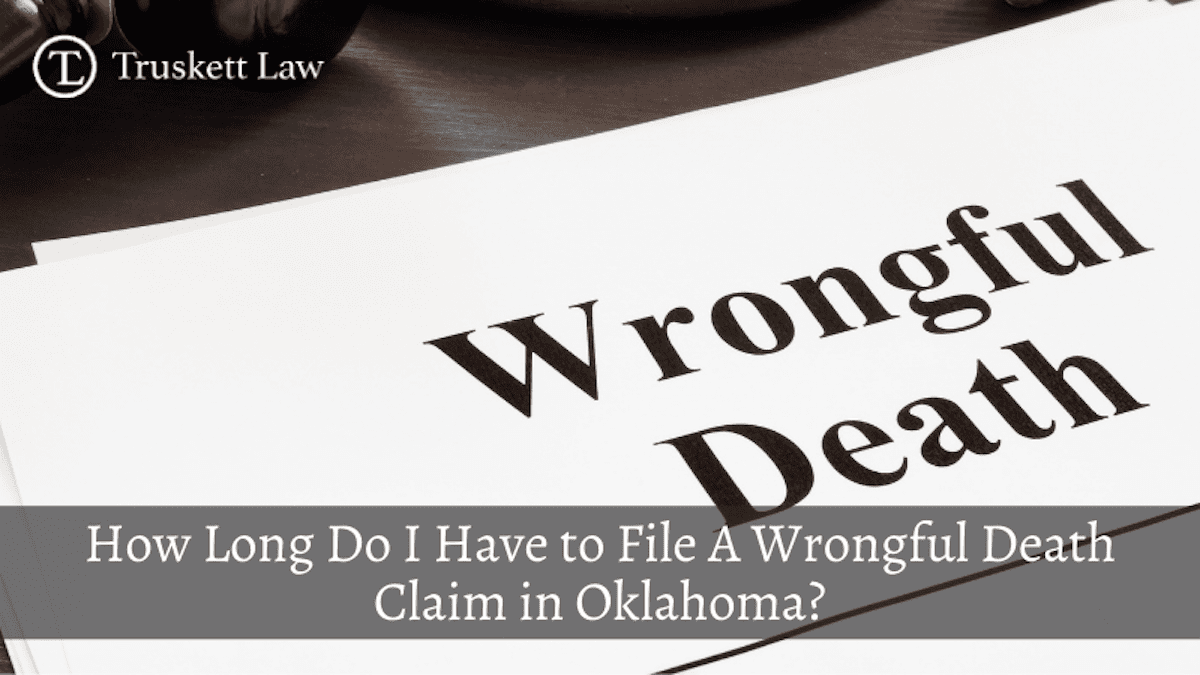
23 May How Long Do I Have to File A Wrongful Death Claim in Oklahoma?
Filing A Wrongful Death Case in Oklahoma
If you have lost a loved one due to someone else’s negligence, you may be wondering how long you have to file a wrongful death case in Oklahoma. The answer to this question depends on several factors, including the cause of death and the relationship between the deceased and the defendant.
So, how long do I have to file a wrongful death claim in Oklahoma? In general, Oklahoma law requires that a wrongful death case be filed within two years of the date of death. However, there are some exceptions to this general rule. For example, if the death was caused by medical malpractice, the claim must be filed within two years of the date of the injury that led to the death.
In addition, if the defendant is a government entity, the claim must be filed within six months of the date of death. Finally, if a defective product caused the death, the claim must be filed within two years of the date when the defect was discovered or should have been discovered.
If you have lost a loved one due to someone else’s negligence, it is important to speak with an experienced wrongful death attorney as soon as possible. An attorney can help you understand the applicable deadlines and ensure that your claim is filed promptly.
Wrongful Death Case Limitations
 Generally speaking, Oklahoma law imposes a two-year statute of limitations on wrongful death claims. This means that a lawsuit must be filed within two years of the loved one’s death.
Generally speaking, Oklahoma law imposes a two-year statute of limitations on wrongful death claims. This means that a lawsuit must be filed within two years of the loved one’s death.
There are a few exceptions to this rule, however, which may extend the deadline for filing a claim.
For example, if the death was caused by medical malpractice, the statute of limitations may be extended to three years. If the death was caused by a defective product, the deadline may be extended to five years.
And if the death was caused by a drunk driver, the deadline may be extended to ten years.
If you’re not sure whether you have a valid wrongful death case, it’s important to seek legal advice as soon as possible. An experienced wrongful death attorney can review the circumstances of your loved one’s death and help you determine whether you have a case. If you do have a valid claim, the attorney will work with you to gather evidence and build a strong case.
He or she will also handle all of the paperwork and filings required by the court. Filing a wrongful death case can be a complex and emotionally devastating process. But with the help of a qualified attorney, you can get the justice and compensation you deserve.
What Is A Wrongful Death Case?
 A wrongful death claim is a civil action brought by the surviving family members of someone who has died as a result of another person or entity’s negligence or wrongful act.
A wrongful death claim is a civil action brought by the surviving family members of someone who has died as a result of another person or entity’s negligence or wrongful act.
The purpose of a wrongful death lawsuit is to seek compensation for the survivors’ loss. This can include damages for emotional distress, loss of companionship, and financial support.
To bring a wrongful death case, the plaintiff must prove that the defendant’s negligence or wrongful act was the cause of the decedent’s death. The burden of proof in a wrongful death action is typically higher than in other civil actions, such as personal injury cases.
This is because the plaintiff must not only prove that the defendant was at fault, but also that the death would not have occurred for the defendant’s negligence or wrongful act.
Common Elements of Wrongful Death Cases
Wrongful death cases are governed by state law. Therefore the specific elements that must be proved to bring a successful claim can vary from state to state. However, some common elements are typically required in most states.
Wrongful death lawsuits are civil cases, not criminal cases, so they cannot result in jail time for the person responsible. However, they can help you recover damages such as medical and funeral expenses, lost earnings, and pain and suffering.
Filing a Wrongful Death Lawsuit
To file a wrongful death lawsuit, you will need to prove that the death was caused by someone else’s negligence or recklessness. This can be difficult to do, so it is important to consult with an experienced lawyer before taking any legal action. If you have a strong case, your lawyer may be able to help you recover damages from the responsible party.
Wrongful death cases are typically brought against individuals or entities who owe a duty of care to the deceased person. For example, a driver who causes a car accident that results in someone’s death may be liable for wrongful death. Similarly, a doctor who fails to diagnose a deadly disease may be held liable if the patient dies as a result.
In some cases, even if the defendant did not directly cause the death, he or she may still be held liable if it can be shown that the death would not have occurred but for the defendant’s negligence. For example, if a company fails to provide adequate security at its premises and someone is killed as a result, the company may be held liable for wrongful death.
It should be noted that to bring a wrongful death case, the plaintiff must be a surviving family member of the deceased person. In most cases, this will include the spouse, children, or parents of the deceased. In some states, however, other relatives, such as siblings or grandparents, may also be able to bring a wrongful death claim.
Wrongful Death Case Process
 If you have lost a loved one due to the negligence of another, you may be able to file a wrongful death case. This type of legal case can be filed against an individual, business, or government entity.
If you have lost a loved one due to the negligence of another, you may be able to file a wrongful death case. This type of legal case can be filed against an individual, business, or government entity.
Step One
The first step in filing a wrongful death case is to identify the responsible party. This may be difficult if your loved one was killed in an accident, but it is important to do your best to identify the responsible party.
Once you have identified the responsible party, you will need to gather evidence to support your claim. This may include medical records, police reports, eyewitness testimony, etc.
Step Two
Once you have gathered the necessary evidence, you will need to file a claim with the responsible party’s insurance company. If the insurance company denies your claim, you may need to file a lawsuit. This process can be complex and time-consuming, so it is important to have an experienced wrongful death attorney on your side.
Keep In Mind
One of the first things to keep in mind is the statute of limitations for filing a wrongful death claim. In most states, this is two years from the date of your loved one’s death.
This may seem like a long time, but it is important to begin gathering evidence and preparing your case as soon as possible. If you wait too long, important evidence may be lost or witnesses may forget what they saw.
You will also need to identify the responsible party or parties in your case. This can be tricky, especially if there is more than one person or entity that you believe is at fault. However, it is important to name all potential defendants in your lawsuit so that you have the best chance of recovering damages.
Finally, be aware that there may be other claims that arise from your loved one’s death, such as a survival action or a claim for pain and suffering. These claims can sometimes be more complex than a wrongful death claim, so it is important to discuss all of your options with an experienced attorney.
If you have lost a loved one due to someone else’s negligence, you may be entitled to compensation. However, the process of filing a wrongful death case can be complex and emotional. By being aware of some key things, you can help ensure that your claim is successful.


Sorry, the comment form is closed at this time.